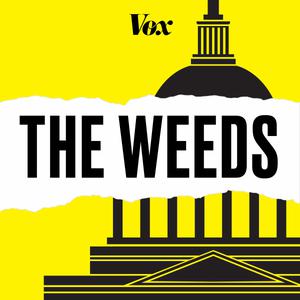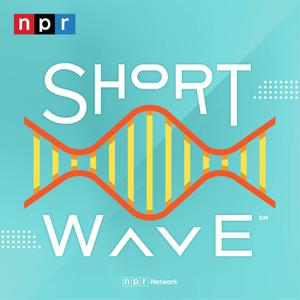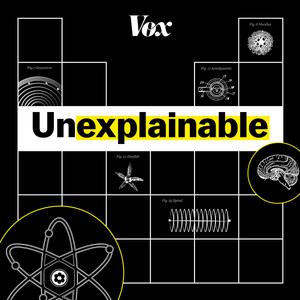
Future Perfect
Vox Media Podcast Network
Finding the best ways to do good.
- 43 minutes 52 secondsSucking the carbon out of the sky
Most of our efforts to fight climate change, from electric cars to wind turbines, are about pumping fewer greenhouse gases into the atmosphere. But what if we could pull out the gases that are already there? Akshat Rathi, a reporter at Bloomberg with a doctorate in chemistry, knows more about this technology, called “direct air capture,” than just about anyone. He follows companies like Carbon Engineering and Climeworks that are trying to figure out how to take regular air and pull carbon dioxide out of it.
If their plans work, they could mean a world with net negative emissions: less carbon in the sky than there is right now, and a cooler planet. But his reporting has also highlighted how elusive carbon capture can be, and how tricky it can be to make the tech work at an affordable price. Rathi and Vox’s Dylan Matthews discuss how direct air capture works, how it’s different from capturing carbon at a fossil fuel plant, and the struggles of one direct air capture company in particular.
Read more of Akshat’s work here:
- Inside America's Race to Scale Direct-Air Capture Technology - Bloomberg
- Crushed Rock Could Capture Billions of Tons of Carbon Dioxide - Bloomberg
- Britain Is Getting Ready to Scale Up Negative-Emissions Technology - Bloomberg
- Planting Trees Isn’t a Simple Climate Change Solution It Seems - Bloomberg
- The story behind the world’s first large direct air capture plant — Quartz (qz.com)
- The ultimate guide to negative-emissions technologies — Quartz (qz.com)
Host:
Dylan Matthews (@DylanMatt), senior correspondent, Vox
Producer:
Sofi LaLonde (@sofilalonde)
More to explore:
Subscribe to Vox’s Future Perfect newsletter, which breaks down big, complicated problems the world faces and the most efficient ways to solve them.
We always want to hear from you! Please send comments and questions to [email protected].
Subscribe to Future Perfect on Apple Podcasts, Spotify, or your favorite podcast app to automatically get new episodes of the latest season each week.
Follow Us:
Support Future Perfect by making a financial contribution to Vox! bit.ly/givepodcasts
Learn more about your ad choices. Visit podcastchoices.com/adchoices
28 April 2021, 4:23 pm - 1 hour 2 minutesShould I still have kids if I’m worried about climate change?
Climate scientist Kimberly Nicholas co-led a study that showed the single most effective thing an individual can do to decrease their carbon footprint is have fewer kids. Despite that finding, she still says that people who really want to have kids should go ahead with their plans. She explains how she squares that circle to Vox’s Sigal Samuel, and the two discuss how to think about the decision to have kids or not and how to make meaning in a warming world.
Read more of Sigal’s climate reporting:
- Having fewer kids will not save the planet
- Where to donate to improve climate policy
- It’s not just Big Oil. It’s Big Meat too.
More information about Dr. Kimberly Nicholas
- Find her new book here
- Read more of her writing on her website
- The podcast she recommended called So Over Population
Host:
Sigal Samuel (@SigalSamuel), staff writer, Vox
Producer:
Sofi LaLonde (@sofilalonde)
More to explore:
Subscribe to Vox’s Future Perfect newsletter, which breaks down big, complicated problems the world faces and the most efficient ways to solve them.
We always want to hear from you! Please send comments and questions to [email protected].
Subscribe to Future Perfect on Apple Podcasts, Spotify, or your favorite podcast app to automatically get new episodes of the latest season each week.
Follow Us:
Support Future Perfect by making a financial contribution to Vox! bit.ly/givepodcasts
Learn more about your ad choices. Visit podcastchoices.com/adchoices
21 April 2021, 3:35 pm - 35 minutes 59 secondsEngineering our way out of the climate crisis
In an ideal world, cutting carbon emissions would be enough to stop global warming. But after dithering for decades, the world needs a back-up plan. Kelly Wanser is the leader of a group called SilverLining that works to promote research into what it calls “solar climate intervention.” Also called “solar geoengineering,” this approach involves putting particles into clouds that reflect back the sun, directly cooling the earth. It’s a novel and potentially hazardous policy — but one that Wanser and other experts argue could hold a lot of promise as the world braces for catastrophic climate impacts. Wanser and Vox’s Dylan Matthews discuss how solar climate intervention works, how it could be implemented, and where it fits in with the goal of cutting emissions.
References:
Kelly Wanser is the executive director of SilverLining. You can find more information at Silverlining.ngo, including its 2019 report on climate intervention research. You can also hear more from Wanser in her 2019 TED Talk.
Host:
Dylan Matthews (@DylanMatt), senior correspondent, Vox
Producer:
Sofi LaLonde (@sofilalonde)
Special thanks to Efim Shaprio (@efimthedream)
More to explore:
Subscribe to Vox’s Future Perfect newsletter, which breaks down big, complicated problems the world faces and the most efficient ways to solve them.
We always want to hear from you! Please send comments and questions to [email protected].
Subscribe to Future Perfect on Apple Podcasts, Spotify, or your favorite podcast app to automatically get new episodes of the latest season each week.
Follow Us:
Support Future Perfect by making a financial contribution to Vox! bit.ly/givepodcasts
Learn more about your ad choices. Visit podcastchoices.com/adchoices
14 April 2021, 6:55 pm - 28 minutes 45 secondsUnexplainable
Unexplainable is a new podcast from Vox about everything we don’t know. Each week, the team looks at the most fascinating unanswered questions in science and the mind-bending ways scientists are trying to answer them. New episodes drop every Wednesday.
This episode: Scientists still don't know how the sense of smell works. But they're looking at how powerful it is — dogs can actually sniff out cancer and many other diseases — and they're trying to figure out how to reverse-engineer it. In fact, one MIT scientist may have built a robot nose ... without completely understanding how his invention works.
Learn more:
Listen on Apple Podcasts: https://podcasts.apple.com/us/podcast/unexplainable/id1554578197
Listen on Spotify: https://open.spotify.com/show/0PhoePNItwrXBnmAEZgYmt?si=Y3-2TFfDT8qHkfxMjrJL2g
Sign up for our newsletter:
http://vox.com/unexplainable-newsletter
Learn more about your ad choices. Visit podcastchoices.com/adchoices
16 March 2021, 9:00 am - 21 minutes 54 secondsRethinking meat
How can we convince people to change their relationship with meat?
Melanie Joy has been grappling with this question for a long time. To answer it, she takes us back to other points in history when new technology helped make social change palatable. She digs into how the invention of the washing machine and other household appliances, for example, helped make feminism easier to imagine.
Then, she looks to the future, at our latest meat technologies — plant-based meat and lab grown meat — and asks: Could they make it easier for us to move away from meat altogether?
Further listening and reading:
- Joy’s books, Powerarchy: Understanding the Psychology of Oppression for Social Transformation and Why We Love Dogs, Eat Pigs, and Wear Cows.
- Vox’s Ezra Klein interviewed Joy for an episode of The Ezra Klein Show in 2018. Hear that interview and read her book recommendations here.
We always want to hear from you! Please send comments and questions to [email protected].
Subscribe to Future Perfect on Apple Podcasts, Spotify, or your favorite podcast app to automatically get new episodes of the latest season each week.
This podcast is made possible thanks to support from Animal Charity Evaluators. They research and promote the most effective ways to help animals.
Featuring:
Melanie Joy (@DrMelanieJoy)
Host:
Sigal Samuel (@SigalSamuel), staff writer, Vox
More to explore:
Follow all of Future Perfect’s reporting on the Future of Meat.
Subscribe to Vox’s Future Perfect newsletter, which breaks down big, complicated problems the world faces and the most efficient ways to solve them.
Follow Us:
Learn more about your ad choices. Visit podcastchoices.com/adchoices
4 November 2020, 10:00 am - 24 minutes 2 secondsCan we raise better beef?
Beef cattle take a huge toll on the environment. In Brazil, a huge chunk of greenhouse gas emissions comes from ranching alone. And a California-sized chunk of the Amazon rainforest has been cut down to provide land for these cattle to graze on.
But one man, living on the edge of the Amazon rainforest, has a potential solution. In a series of small pilot projects run in his own small town, he’s demonstrated that he can work with ranchers to make their land healthier and more sustainable, so they don’t have to slash and burn more forest. He’s also shown that, by making the land greener and the cows healthier, he can dramatically reduce emissions from ranching.
Further listening and reading:
- Christina Selby’s story about Vando Telles’s company can be found at Scientific American.
- Vox video has an in-depth explainer on deforestation in the Amazon and on the invasion of indigenous land in Brazil.
- Vox video also has an explainer on why eating beef speeds up climate change.
- Vox’s Umair Irfan traveled to Brazil last year to report on deforestation and climate change.
We always want to hear from you! Please send comments and questions to [email protected].
Subscribe to Future Perfect on Apple Podcasts, Spotify, or your favorite podcast app to automatically get new episodes of the latest season each week.
This podcast is made possible thanks to support from Animal Charity Evaluators. They research and promote the most effective ways to help animals.
Featuring:
Christina Selby (@Christina Selby), freelance science reporter
Host:
Sigal Samuel (@SigalSamuel), staff writer, Vox
More to explore:
Follow all of Future Perfect’s reporting on the Future of Meat.
Subscribe to Vox’s Future Perfect newsletter, which breaks down big, complicated problems the world faces and the most efficient ways to solve them.
Follow Us:
Learn more about your ad choices. Visit podcastchoices.com/adchoices
28 October 2020, 9:00 am - 24 minutes 32 secondsHow to prevent a factory farmed pandemic
What if the next pandemic comes, not from wet markets overseas, but from our own factory farms? Martha Nelson, who studies viruses at the NIH, says we are playing Russian roulette with potentially dangerous influenza strains on our pig farms.
In this episode, we explain what makes these giant farms so likely to breed the next pandemic virus — and spread that virus into the world. And then, we look at solutions — from creating a virus-resistant pig, to developing a universal vaccine, to changing the systems we have for raising meat itself.
Further listening and reading:
- Sigal Samuel wrote an in-depth explainer on the pandemic risks of factory farms earlier this year. She’s also written about “wet markets.”
- The Vox video team also made an explainer video on the same subject.
- For more on how viruses can spread in the pig population, Martha Nelson has an excellent paper “When Pigs Fly.”
- The Food and Agriculture Organization of the United Nations wrote a 2013 report on the health risks of factory farming.
- Sonia Shah’s book Pandemic is a great primer on how pandemic strains arise.
We always want to hear from you! Please send comments and questions to [email protected].
Subscribe to Future Perfect on Apple Podcasts, Spotify, or your favorite podcast app to automatically get new episodes of the latest season each week.
This podcast is made possible thanks to support from Animal Charity Evaluators. They research and promote the most effective ways to help animals.
Featuring:
Byrd Pinkerton (@byrdala), podcast producer, Vox
Martha Nelson (@swientist), epidemiologist, National Institutes of Health
Juergen Richt (@juergenricht), professor of veterinary medicine, Kansas State University
Host:
Sigal Samuel (@SigalSamuel), staff writer, Vox
More to explore:
Follow all of Future Perfect’s reporting on the Future of Meat.
Subscribe to Vox’s Future Perfect newsletter, which breaks down big, complicated problems the world faces and the most efficient ways to solve them.
Follow Us:
Learn more about your ad choices. Visit podcastchoices.com/adchoices
21 October 2020, 9:00 am - 23 minutes 29 secondsThese bacteria wear chicken shoes
Right now, we can fight off a wide range of bacterial infections using antibiotics. But those antibiotics are becoming increasingly ineffective, and antibiotic use on factory farms is partially to blame.
In this episode, Lance Price and Cindy Liu, two public health researchers, explain that we give animals a steady dose of antibiotics in their feed, hoping to stave off disease in cramped, unsanitary conditions. But as a result, the bacteria in these animals develop resistance to antibiotics. But they have some suggestions for how we could make our antibiotics last.
Further listening and reading:
- Sigal Samuel has written in depth about the antibiotic risks posed by our factory farms.
- Liu and Price’s full study is worth a read, as is this Wired writeup of its findings.
- The episode mentions some of the work that Canada and Denmark have done to combat this resistance problem.
- It also digs into the use of the antibiotic Colistin in Chinese farms, and the subsequent spread of resistance.
We always want to hear from you! Please send comments and questions to [email protected].
Subscribe to Future Perfect on Apple Podcasts, Spotify, or your favorite podcast app to automatically get new episodes of the latest season each week.
This podcast is made possible thanks to support from Animal Charity Evaluators. They research and promote the most effective ways to help animals.
Featuring:
Byrd Pinkerton (@byrdala), podcast producer, Vox
Martha Nelson (@swientist), epidemiologist, National Institutes of Health
Juergen Richt (@juergenricht), professor of veterinary medicine, Kansas State University
Host:
Sigal Samuel (@SigalSamuel), staff writer, Vox
More to explore:
Follow all of Future Perfect’s reporting on the Future of Meat.
Subscribe to Vox’s Future Perfect newsletter, which breaks down big, complicated problems the world faces and the most efficient ways to solve them.
Follow Us:
Learn more about your ad choices. Visit podcastchoices.com/adchoices
14 October 2020, 9:00 am - 25 minutes 6 secondsLife on the fast line
Workers in meatpacking plants already process our pigs and beef and chickens extremely fast, but recently, there’s been a push to make the meatpacking factory line move even faster.
Isaac Arnsdorf, a ProPublica reporter, takes us deep into his reporting on why that would be extremely dangerous for workers’ health. Then Jill Mauer, a federal meat inspector, explains why she’s worried that the changes in inspections necessary to make these faster line speeds possible could endanger us all.
Further listening and reading:
- We based the first half of this episode on reporting in Isaac Arnsdorf’s ProPublica piece on changing line speeds.
- For more on changing line speeds, there are great background pieces from the New York Times’s Julie Creswell and the Washington Post’s Kimberly Kindi.
- Jill’s full NBC interview, which we excerpted in the episode
- The Food Integrity Campaign within the Government Accountability Project pulled together this report with affidavits from federal inspectors in pilot plants.
We always want to hear from you! Please send comments and questions to [email protected].
Subscribe to Future Perfect on Apple Podcasts, Spotify, or your favorite podcast app to automatically get new episodes of the latest season each week.
This podcast is made possible thanks to support from Animal Charity Evaluators. They research and promote the most effective ways to help animals.
Featuring:
Isaac Arnsdorf (@iarnsdorf), reporter, ProPublica
Host:
Dylan Matthews (@dylanmatt), senior correspondent, Vox
More to explore:
Follow all of Future Perfect’s reporting on the Future of Meat.
Subscribe to Vox’s Future Perfect newsletter, which breaks down big, complicated problems the world faces and the most efficient ways to solve them.
Follow Us:
Learn more about your ad choices. Visit podcastchoices.com/adchoices
7 October 2020, 9:00 am - 28 minutes 50 secondsChicken Big
In 1992, Craig Watts got into growing chickens for Perdue Farms because he was told he could turn a good profit. Instead, he found himself hundreds of thousands of dollars in debt, and unable to bargain for better working conditions because Perdue was the only game in town. Things seemed hopeless, until, in 2010, President Obama’s Department of Justice announced that they were going to look into the relationship between big poultry companies and their growers.
In this episode, reporter Leah Douglas tells us how farmers like Craig fought to change the balance of power in chicken growing a decade ago — and what has happened since.
Further listening and reading:
- In his book The Meat Racket, Christopher Leonard outlines the problems with contract poultry growing in much more depth, and goes into the history of the practice.
- Leah Douglas and Christopher Leonard also did a recent, in-depth investigation into problems with the US chicken industry’s treatment of farmers.
- You can watch the Department of Justice public workshops for yourself, or read transcripts, all available here.
- The National Chicken Council has compiled an FAQ that pushes back on claims that poultry growers have problems.
We always want to hear from you! Please send comments and questions to [email protected].
Subscribe to Future Perfect on Apple Podcasts, Spotify, or your favorite podcast app to automatically get new episodes of the latest season each week.
This podcast is made possible thanks to support from Animal Charity Evaluators. They research and promote the most effective ways to help animals.
Featuring:
Byrd Pinkerton (@byrdala), podcast producer, Vox
Leah Douglas (@leahjdouglas), reporter, Food and Environment Reporting Network
Host:
Dylan Matthews (@dylanmatt), senior correspondent, Vox
More to explore:
Follow all of Future Perfect’s reporting on the Future of Meat.
Subscribe to Vox’s Future Perfect newsletter, which breaks down big, complicated problems the world faces and the most efficient ways to solve them.
Follow Us:
Learn more about your ad choices. Visit podcastchoices.com/adchoices
30 September 2020, 9:00 am - 25 minutes 17 secondsThe paradox on our plates
In the US, we spend billions of dollars a year pampering our pets. We have laws to protect them from harm and to punish those who inflict it on them. And yet, we routinely abuse pigs and chickens on farms, cutting off their beaks and tails without anesthesia, and cramming them into cages.
In this episode, neuroscientist Lori Marino helps us understand how arbitrarily we draw the lines between animals as pets and animals as food, and how we might redraw those lines.
Further listening and reading:
- Lori Marino has done in-depth round-ups of all the research on chicken cognition and pig cognition.
- You might also enjoy this study, where students who worked with chickens were surprised by their intelligence
- In the piece, we used clips from this BBC Earth segment on how pig intelligence compares to toddler intelligence, and a Compassion in World Farming piece on pigs and video games
- Dylan Matthews has written in depth about unnecessarily painful pig castration. He’s also written about the practice of mass-culling male chicks.
- For more on what labels like “wild caught,” “organic,” and “grass-fed” actually mean for the food you eat, Rachel Krantz wrote a comprehensive guide. We also have more information on what it means for eggs to be “cage-free.”
We always want to hear from you! Please send comments and questions to [email protected].
Subscribe to Future Perfect on Apple Podcasts, Spotify, or your favorite podcast app to automatically get new episodes of the latest season each week.
This podcast is made possible thanks to support from Animal Charity Evaluators. They research and promote the most effective ways to help animals.
Featuring:
Lori Marino, Kimmela Center for Animal Advocacy
Hosts:
Sigal Samuel (@SigalSamuel), staff writer, Vox
More to explore:
Follow all of Future Perfect’s reporting on the Future of Meat.
Subscribe to Vox’s Future Perfect newsletter, which breaks down big, complicated problems the world faces and the most efficient ways to solve them.
Follow Us:
Learn more about your ad choices. Visit podcastchoices.com/adchoices
23 September 2020, 9:00 am - More Episodes? Get the App
Your feedback is valuable to us. Should you encounter any bugs, glitches, lack of functionality or other problems, please email us on [email protected] or join Moon.FM Telegram Group where you can talk directly to the dev team who are happy to answer any queries.
 Explain It to Me
Explain It to Me
 The Gray Area with Sean Illing
The Gray Area with Sean Illing
 The Daily
The Daily
 Today, Explained
Today, Explained
 Short Wave
Short Wave
 Unexplainable
Unexplainable